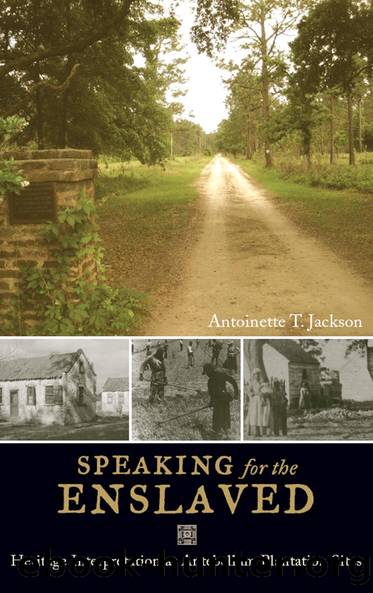Speaking for the Enslaved by Antoinette T Jackson

Author:Antoinette T Jackson [Jackson, Antoinette T]
Language: eng
Format: epub
Tags: History, United States, State & Local, South (AL; AR; FL; GA; KY; LA; MS; NC; SC; TN; VA; WV), Political Science, Public Policy, Cultural Policy, Psychology, Cognitive Psychology & Cognition, Social Science, Ethnic Studies, American, African American & Black Studies, Anthropology, General, Archaeology, Customs & Traditions, Sociology, Technology & Engineering, Agriculture
ISBN: 9781315419961
Google: qrRmDAAAQBAJ
Publisher: Routledge
Published: 2016-06-16T05:10:34+00:00
CULTURAL PRESERVATION IN ANTEBELLUM PLANTATION SPACES
This chapter critically examines categorization as an active process of knowledge construction that directly influences ways in which we interpret the past and, more important, create interpretations for future generations. One outcome of reinterpreting the labor practices is that sharecropper, as a fixed and universally representative laborer category of descendants of enslaved Africans and one that legitimizes and reinforces notions of dependency, is disrupted. Instead, we find descendantsâ interpretations of their own work lives and roles as laborers are much broader. However, the sharecropper label is just one example of how categorizations misrepresent how descendants of enslaved Africans understood their occupational statuses in Mount Pleasant. Some narratives also reveal how limited terminology about and limited understanding of labor roles obscure the skilled nature of labor that Africans performed and masks cultural continuity and agency expressed on a family and community level. There was an intergenerational transmission of knowledge about foodways and labor practices that still marks cultural preservation practices in African communities in former antebellum plantation spaces.
Whenever I spoke to long-time African-American residents of Mount Pleasant, they consistently stated: âWe were never sharecroppers.â After I examined tourist literature, local history accounts, and academic sources, their reasons for contesting the sharecropper label became obvious. In public historical profiles, descendants of enslaved Africans were represented as having progressed along a hierarchy from former slaves to sharecroppers (see Charleston Area Convention and Tourist Bureau website advertisement of a 2008 museum exhibit âFrom Slave to Sharecropperâ). The sharecropper category refers to a farmer who is given credit for seeds, tools, food, housing, and access to land, with part of the harvest going to repay the landowner. This description typically implies that the sharecropper is not a landowner. Such a description fails to recognize the land-ownership status and distinctions in employment patterns of many descendants. For example, this excerpt from a tourist website for the city of Charleston, describing Boone Hall Plantation, still refers to descendants as sharecroppers: âThe plantation [Boone Hall] includes a large post-civil-war farmhouse, a number of original slave cabins (which were occupied by sharecroppers well into the twentieth century), several flowering gardens, â¦â (Charleston Private Equity LLC website n.d.).
Indiscriminate use of the term sharecropper masks the dynamic ways in which descendants of enslaved Africans interpreted their lives and the wide range of skilled laborer roles that they assumed in plantation communities. By focusing on a single category of labor, the use of sharecropping, as universally representative of the scope of work that enslaved Africans and their descendants engaged in, does not acknowledge the breadth of labor practices in antebellum and postbellum plantations. Such limited characterizations reveal how fixed notions of identity within an antebellum plantation narrative create and reproduce narrow representations of enslaved Africans and their descendants, as well as limited interpretive options for public presentations of national history.
The significance of categorization and categorical systems to this discussion is that the value attached to them as forms of knowledge about the past has significant implications in the present (Valentine 2007).
Download
This site does not store any files on its server. We only index and link to content provided by other sites. Please contact the content providers to delete copyright contents if any and email us, we'll remove relevant links or contents immediately.
Chaco's Northern Prodigies : Salmon, Aztec, and the Ascendancy of the Middle San Juan Region after AD 1100 by Paul F. Reed(379)
Digital International Relations by Unknown(376)
Law Enforcement Interpersonal Communication and Conflict Management by Brian Douglas Fitch(366)
Skilled interpersonal communication: Research, theory and practice, Fifth edition by Owen Hargie(355)
The Enduring Color Line in U.S. Athletics by Krystal Beamon Chris M. Messer(353)
Critical Perspectives on Human Security : Rethinking Emancipation and Power in International Relations by David Chandler; Nik Hynek(342)
EPSO CAST Political affairs EU policies: How to succeed in the selection procedure by Franco Reverte José María(329)
Evidence-Based Policy Making in Labor Economics by Hamermesh Daniel S.;Nottmeyer Olga K.;Nottmeyer Olga;King Sarah;King Sarah;King Sarah;(319)
Writing Public Policy - A Practical Guide to Communicating in the Policy Making Process by Catherine F. Smith(297)
Criminological Theory in Context by John Martyn Chamberlain(295)
Rothschild and Early Jewish Colonization in Palestine (Geographical Perspectives on the Human Past) by Ran Aaronsohn(292)
Positive Psychology and Spirituality in Counselling and Psychotherapy (Conflict, Ethics, and Spirituality, 12) by unknow(289)
Tibeton Yoga Its Secret Doc by Evans-Wentz(283)
Social Problems, Social Issues, Social Science by James Wright(280)
Threshold Concepts in Women's and Gender Studies by Christie Launius Holly Hassel(279)
Cognitive Development in Infancy and Childhood (Elements in Child Development) by Mary Gauvain(273)
Play in child development and psychotherapy: toward empirically supported practice by Sandra W. Russ(272)
Latin American Politics and Society by Gerardo L. Munck & Juan Pablo Luna(253)
The Arab Spring Abroad: Diaspora Activism against Authoritarian Regimes by Dana M. Moss(234)
